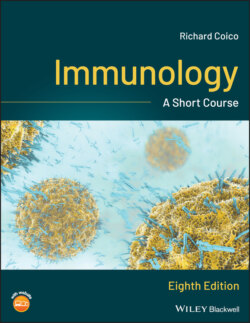Читать книгу Immunology - Richard Coico - Страница 122
SUMMARY
Оглавление1 Immunogenicity is the capacity of a compound to induce an immune response. Immunogenicity requires that a compound (a) be foreign to the immunized individual, (b) possesses a certain minimal molecular weight, (c) possesses a certain degree of chemical complexity, and (d) be degradable or susceptible to antigen processing and presentation through its interaction with MHC.
2 Antigenicity refers to the ability of a compound to bind with antibodies or with cells of the immune system. This binding is highly specific; the immune components are capable of recognizing various physicochemical aspects of the compound. The binding between antigen and immune components involves several weak forces operating over short distances (van der Waals forces, electrostatic interactions, hydrophobic interactions, and hydrogen bonds); it does not involve covalent bonds.
3 The smallest unit of antigen that is capable of binding with antibodies and T cells is called an antigenic determinant or epitope. Compounds may have one or more epitopes capable of reacting with immune components. The immune response against these compounds involves the production of antibodies or the generation of cells with specificities directed against most or all of the epitopes.
4 B‐cell membrane immunoglobulin or secreted antibody tends to recognize amino acid sequences that are accessible, usually hydrophilic, and mobile. These can be contiguous or noncontiguous amino acids (conformational determinants), which are brought into proximity by the three‐dimensional folding of the protein. B‐cell membrane immunoglobulins and antibody are capable of recognizing polysaccharides and lipids.
5 T cells recognize internal amino acid sequences of proteins in the context of MHC class I or class II molecules. Peptide fragments of protein antigens generated by antigen processing may associate with MHC molecules and be presented to T cells.
6 Immunological cross‐reactivity denotes a situation in which two or more substances, which may have various degrees of dissimilarity, share epitopes and would, therefore, react with the immune components induced against any one of these substances. Thus a toxoid, which is a modified form of toxin, may have one or more epitopes in common with the toxin. Immunization with the toxoid leads to an immune response capable of reacting not only with the toxoid but also with the native toxin.
7 Adjuvants are substances that can accelerate, prolong, and enhance the quality of specific immune responses. When administered with antigens, adjuvants facilitate immune responses that are specific for the antigen (not for adjuvant itself) since the adjuvant nonspecifically amplifies the response. The principal mechanisms include increased antigen presentation by APCs (especially dendritic cells), induction of co‐stimulatory molecules, and induction of local inflammatory cytokine responses.[xnl][xsb]
